
Save the Date: Postgradaute Research Conference

Latest research and knowledge exchange news at Bournemouth University

Hardly ever does a research trip go smoothly and completely to plan. Our latest trip to Nepal was no different. It started really with a delay, I had the money for a flight in the spring, but I really could not find the time to leave Bournemouth University for a three-week trip.
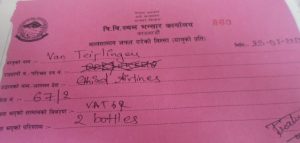 The first little hiccup of this summer’s fieldwork trip, during the monsoon, occurred on arrival at Kathmandu Airport on 23 July. I normally bring three bottles of whisky as a present for my PhD former students and fellow researchers in Nepal. These are bought during my stop-over in the Middle East and this always worked well until this year. This time I was stopped on arrival by a very apologetic customs officer who informed me that the rules for bringing alcohol into Nepal had changed since the beginning of this year and that I could only bring in one bottle. I received a lovely certificate for the two bottles I had to leave behind (see photo).
The first little hiccup of this summer’s fieldwork trip, during the monsoon, occurred on arrival at Kathmandu Airport on 23 July. I normally bring three bottles of whisky as a present for my PhD former students and fellow researchers in Nepal. These are bought during my stop-over in the Middle East and this always worked well until this year. This time I was stopped on arrival by a very apologetic customs officer who informed me that the rules for bringing alcohol into Nepal had changed since the beginning of this year and that I could only bring in one bottle. I received a lovely certificate for the two bottles I had to leave behind (see photo).
The second little hiccup was that one of the three research dissemination meetings we had hoped to organise in Kathmandu could not take place. Unfortunately, the organisation we had been collaborating with had not managed to finalise the research report on time. We had also hoped to meet up with staff at Social Science Baha. We have submitted the final draft manuscript for our next book to them and wanted to discuss progress, but the director was unfortunately out of the country.
Further little hiccups were more mundane, such as the electricity going off twice (for perhaps five minutes each time) during one of my teaching sessions on Introduction to Qualitative Research. This meant trying to start a slow laptop as back-up, whilst restarting a still warm overhead projector, etc. But the Nepali audience, being used this, took it all in its stride. And I’ll spare you the details of my day of diarrhoea (either weather or food-hygiene related, probably both).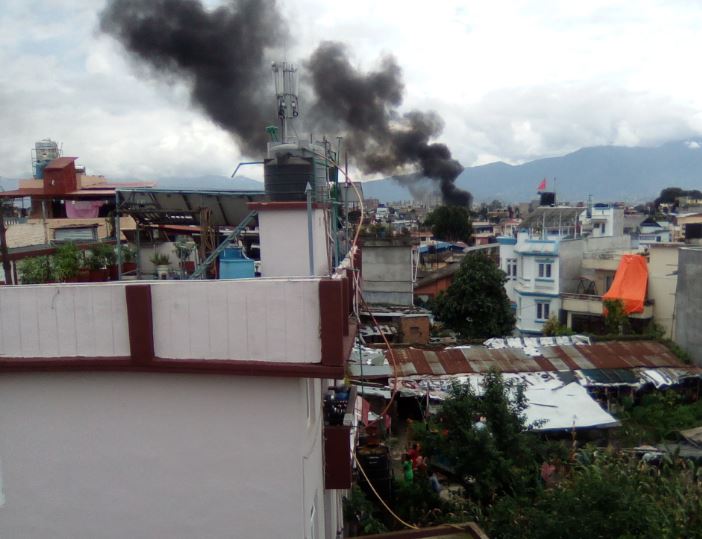
The biggest problem this time was much more unexpected. Two days ago there was a big fire not too far from in Kathmandu (see picture taken from my bed room). A little later after the photo was taken, we got stuck in traffic because several roads were blocked around the burning building on our way to Tribhuvan University. Later I found out that the fire had destroyed the head office of a national internet provider, which is also the provider for the charity Green Tara Nepal, which we are working with. So I have had hardly any internet for a few days which is really difficult for a 21st century academic.
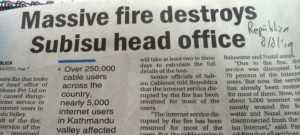
However, this fieldwork trip has been very successful to date. We have co-organised two well attended meetings, one on the introduction of CPD in Nursing led by Dr. Bibha Simkhada (see previous BU blog here) and one Consultation meeting on migration and health research led by Dr. Pramod Regmi, both run in collaboration with BU’s Visiting Professor Padam Simkhada. Moreover, I was invited to speak at an international sociology conference last Sunday here in Kathmandu which I did not even know was going on till two days before. I had to pleasure of meeting our midwifery friends in Nepal as well as a representative of the German Aid Agency GIZ. We managed to have dinner in Kathmandu with loads of colleagues and friends who work with BU in one form or another, including one of my recent co-authors from the University of Tokyo who happened to be in Nepal.
Prof. Edwin van Teijlingen
CMMPH
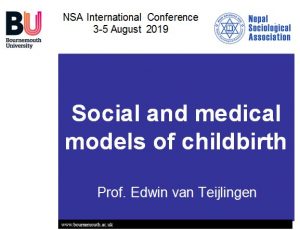 Yesterday Prof. Edwin van Teijlingen from CMMPH (Centre for Midwifery, Maternal & Perinatal Health) gave a presentation on ‘Social and Medical Model of Childbirth’ at the International Conference 2019 with the specific title ‘Sociology of Nepal: State Restructuring, Good Governance & People’s Participation’. This international conference was organised by NSA (Nepal Sociological Association) in Kathmandu.
Yesterday Prof. Edwin van Teijlingen from CMMPH (Centre for Midwifery, Maternal & Perinatal Health) gave a presentation on ‘Social and Medical Model of Childbirth’ at the International Conference 2019 with the specific title ‘Sociology of Nepal: State Restructuring, Good Governance & People’s Participation’. This international conference was organised by NSA (Nepal Sociological Association) in Kathmandu.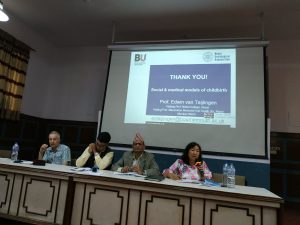
Prof. van Teijlingen outlined the notion of the social-medical model [1-5] and linked it to recent developments in Nepal, including the introduction of midwifery education (i.e. midwifery separately from nursing) something tat has been advocated for a long time [6] and the rising Caesarean Section rate in Nepal, especially in hospitals in the capital [7].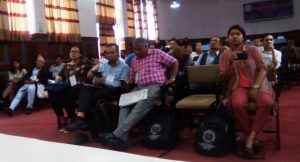
References:

Following the government’s industrial strategy grand challenge on Ageing Society, this year’s conference will be exploring the theme of frailty. The key areas will be:
Keynote Speakers
Professor Martin Vernon, National Director for Older People, NHS England
Professor Mark Hawley, Professor of Health Services Research (ScHARR), Director Centre for Assistive Technology and Connected Care (CATCH), University of Sheffield
Event Information
Sixteenth Annual Symposium, Frailty: Enhancing Lives, Wednesday 9 October, Bournemouth University, Executive Business Centre (EBC), Lansdowne, Bournemouth.
Register now for your free place
Audrey Dixon
CoPMRE Manager

I recently presented a paper and poster at the EDULEARN19 Conference. The paper reported a study which measured different elements of psychological literacy in students across five different disciplines. Sarah Coady, a voluntary Psychology Research Assistant, helped me with some of the data analysis and for this work she won a BU co-creation Award in May. Also, I presented a poster with the title ‘Psychological literacy for all’, to show how psychological literacy is relevant for students of all disciplines. Both papers are published by IATED in the Proceedings of the 11th International Conference on Education and New Learning Technologies.

Bournemouth University in collaboration with Royal Bournemouth and Christchurch Hospitals NHS Foundation Trust (RBCH) held a very successful conference (sold out!) on July 1st to discuss the topic of nurse retention and our Burdett Trust for Nursing funded research project- Making TRACS to improve nurse retention (Principal Investigator- Janet Scammell). This conference attracted 100 attendees representing nurse clinicians, workforce developers, and education and training from across Dorset.
Nurse retention is a highly problematic concern across the UK and negative impacts are felt within patient quality of care, individuals’ wellbeing and healthcare systems. To address this issue, this project aimed to investigate whether the retention of registered nurses at RBCH can be improved through the use of the TRACS nurse retention model. Developed from an extensive literature review, the TRACS model focuses on key factors known to impact on intention to stay: supporting Transition at key career junctures, building Resilience, facilitating Authentic leadership throughput the organisation, securing Commitment to support changing work practices and providing on-going Support for staff.
Incorporating the elements of the TRACS model and involving registered nurses from RBCH in what is needed to improve nurse retention, this project developed the online resource- Support4Nurses http://support4nurses.uk/. This was presented at the conference as well as our key findings of the three main areas to improve nurse retention: staff development, authentic leadership and valuing staff, and supporting health and wellbeing. Future plans are to work with RBCH to implement learning from this project at a local level as well as share our approach and outcomes more widely.
We will be posting slides of the presentations on our website in the coming weeks. If you have any questions about the conference, please contact Janet Scammell at jscammell@bournemouth.ac.uk.
The Doctoral College plays a central role in the development of the postgraduate research community, culture and environment here at BU. On 1st & 2nd July 2019, the Doctoral College Research Skills and Development Officer (Natalie Stewart) attended the UK Council for Graduate Education (UKCGE) Annual Conference with this year’s theme ‘enhancing postgraduate research cultures’ hosted at the University of Salford, MediaCity, Manchester.
The conference had a strong focus on how institutions can support positive PGR cultures and communities in which students can realise their potential. We explored the value of PGR education, listened to experiences of PGR students and discussed what a thriving PGR culture looks like. We also heard from Dr Mark Bennett from FindAUniversity who surveyed prospective PGRs on their expectations of a research degree, findings of which could help inform future provisions.
Day 2 was filled with thought-provoking oral presentation and workshops facilitated by colleagues from Heriot-Watt University, Birmingham City University, Imperial College London and University of Bath. They had us discussing and reflecting on our institutional support for PGRs in particular the activities and events we offer and whether these are actually what students want, how we measure event success, how we support PGRs ‘writing up’ and those PGRs approaching their Viva Voce examination. (If you would like to know how the Doctoral College currently supports these areas please get in touch). For further conference highlights you can view the #UKCGE19 twitter feed.
I look forward to working closely with PGRs and colleagues to further enhance the PGR research culture here at BU.
Please feel free to contact me if you have any thoughts or ideas you would like to discuss regarding PGR support. PGRs can freely submit feedback and suggestions via the anonymous RDP Feedback Survey which remains open year round.

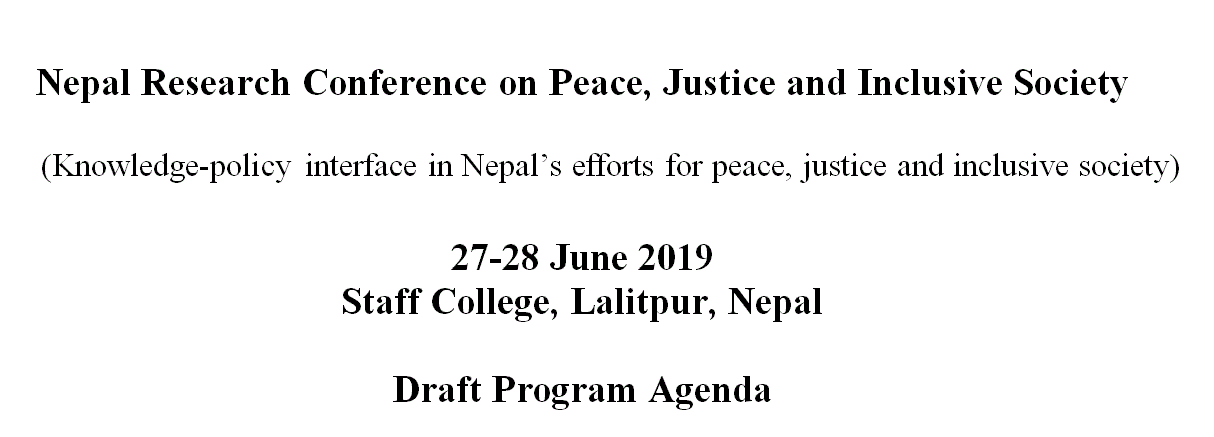 Prof. Bhimsen Devkota will be presenting our paper ‘Challenges and Dilemmas in Conducting Conflict Research During Armed Violence: Lessons Learnt from Fieldwork in Nepal’ at a conference tomorrow. The two-day Nepal Research Conference on Peace, Justice and Inclusive Society will be held in Lalitpur, Nepal. Bhimsen was my PhD student at the University of Aberdeen and he is now based at the leading government university in Nepal, Tribhuvan University. He studied the role and motivations of Maoist health workers in Nepal who were part of the insurgency against the government /king (1995-2006). We published four papers on his exciting fieldwork [1-4].
Prof. Bhimsen Devkota will be presenting our paper ‘Challenges and Dilemmas in Conducting Conflict Research During Armed Violence: Lessons Learnt from Fieldwork in Nepal’ at a conference tomorrow. The two-day Nepal Research Conference on Peace, Justice and Inclusive Society will be held in Lalitpur, Nepal. Bhimsen was my PhD student at the University of Aberdeen and he is now based at the leading government university in Nepal, Tribhuvan University. He studied the role and motivations of Maoist health workers in Nepal who were part of the insurgency against the government /king (1995-2006). We published four papers on his exciting fieldwork [1-4].
During the conflict the Maoist recruited their own health workers to treat combatants (Bandage) and to provide limited services to the communities under their control. 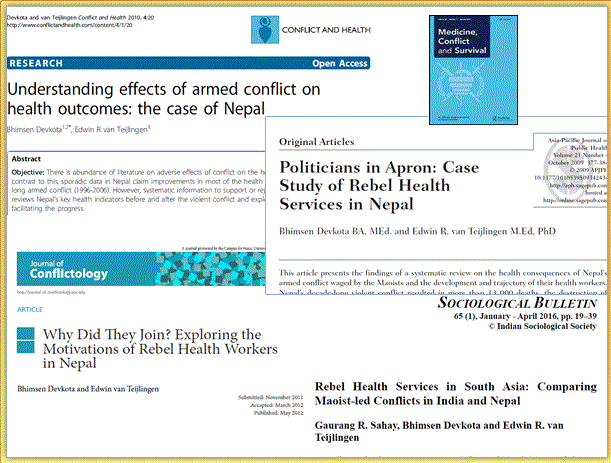 However, there was no systematic information on numbers, their abilities/ skills, experience and career motivations and their integration strategies in the subsequent peace process. During his fieldwork in rebel controlled areas Bhimsen had to use all his social and emotional skills to get the research done. He is the only PhD student I have ever supervised who was put a gun to his head during his fieldwork. Our paper is highlighting some of these real-life research issues, including gaining trust and having an identity acceptable to the research participants.
However, there was no systematic information on numbers, their abilities/ skills, experience and career motivations and their integration strategies in the subsequent peace process. During his fieldwork in rebel controlled areas Bhimsen had to use all his social and emotional skills to get the research done. He is the only PhD student I have ever supervised who was put a gun to his head during his fieldwork. Our paper is highlighting some of these real-life research issues, including gaining trust and having an identity acceptable to the research participants.
Prof. Edwin van Teijlingen
CMMPH (Centre for Midwifery, Maternity & Perinatal Health)
References:

4th September 2019. 10am – 4:45pm. University of Central Lancashire, Preston. UK.
Are you passionate about science and your field of work? Do you think you can excite and inspire the next generation of young scientists? Have you got an interesting science story to tell the public?
The Interact Symposium is a free one day event for those working in physical and life sciences, and over 120 delegates have already registered. There are over 20 exciting workshops planned that will appeal to people at all stages of their careers and especially early career researchers.
If you are looking for taster sessions on how to start your engagement work, or looking to improve your evaluation skills, this is the symposium for you! Most of the day is devoted to workshops covering our 3 main themes – reaching underserved audiences, schools outreach and sharing practice – with a strong emphasis on evaluation throughout. The Market place offers a wide range of interactives to show and tell sessions on engagement in practice plus lots and lots of free resources and professional advice to help you in your work.
There will also be plenty of time to network. The University of Central Lancashire is also hosting a free reception from 6-8pm on the 3rd September and this is your chance to try local delicacies and meet colleagues and engagement experts in an informal environment.
STFC are offering travel and subsistence bursaries of up to £100 for PhD, postdoctoral researchers, fellows and those within 10 years of their first academic appointment to attend. All you have to do is send an email with a short paragraph justifying your case with “Why do I want to go to Interact 2019? ”to Nicky.Bladen-Hovell@stfc.ukri.org.
Applications will be treated on a first come first served basis and the final closing date is 5pm July 31 2019.
The draft programme will be available soon, please check the registration site for details.
Last week saw BU Lecturer in Criminology and former British police sergeant: Dr Richard Heslop, delivering an invited paper at the Fourth Annual Canterbury Centre for Policing Research Conference.
The conference was held at Canterbury Christchurch University, UK, between 19 – 20 June; on the theme of: ‘Austerity and Ethics: A Paradox for Professionalism’.
A sub-theme of this year’s conference was the forthcoming significant developments in police education in England and Wales, under the Police Education Qualifications Framework (PEQF).[1] The PEQF has been developed to professionalise the public police and to reform perceived problematic aspects of police culture and improve ethical standards. The PEQF provides UK Higher Education Institutions (HEIs) with a key role in police education. From January 2020, all new police recruits will be required to obtain a degree level qualification before joining the police or in the initial years of service.
In his paper entitled: ‘Are UK universities more ethical than police organisations?’ Dr Heslop compared police organisations and HEIs from the perspective of their ethical behaviours and practices. After discussing historical and contemporary ethical problems in policing, Dr Heslop explored how, in recent years, universities, academics and students have also faced scrutiny and censure in relation to a range of unethical behaviours and practices. These include:
Dr Heslop concluded that universities are no more ethical than the police and his paper contributes to a body of literature which cautions against assumptions that involving HEIs in police education will lead to improvements in the practices of the police [2].
Dr Heslop is seeking critical feedback on this paper and will be pleased to supply a copy to colleagues with the inclination and time to review it.
[1] Police Education Qualifications Framework available at: https://www.college.police.uk/What-we-do/Learning/Policing-Education-Qualifications-Framework/Pages/Policing-Education-Qualifications-Framework.aspx
[2] See, for example: Heslop, R (2011). Reproducing police culture in a British university: an exploratory study of police foundation degrees. Police Practice & Research: An International Journal, 12(4), 293-312.
To mark World Suicide Prevention Day 2019, the Institute for Mental Health warmly invites you to attend:
The programme will feature keynote talks from researchers in Suicide and Self-Harm, Dr Jo Robinson, Dr Maria Michail and Dr Anna Lavis. You will also hear the latest in interdisciplinary research at the University of Birmingham from our Early Career Researchers and current PhD students.
Professor Jo Robinson leads Orygen’s suite of research programmes around suicide prevention. She currently coordinates several research projects in collaboration with Australian and overseas universities. Professor Robinson’s work focuses on improving our knowledge about the best approaches to reduce suicide risk among young people. This includes developing programs, testing novel approaches that specifically target at-risk youth, and translating the research evidence into practice and policy. She has also been involved in the development of several government-commissioned community resources and has contributed to numerous advisory panels and expert committees.
Dr Maria Michail is a Senior Birmingham Fellow in the Institute for Mental Health at the University of Birmingham. Dr Michail leads an established research programme on youth suicide prevention. She has significant experience working in primary care settings and collaborates closely with the UK Royal College of General Practitioners to develop and evaluate educational resources support GPs in the assessment and management of suicidality in primary care.
Dr Anna Lavis is a Lecturer in Medical Sociology and Qualitative Methods and a member of the Institute for Mental Health. Her work explores individuals’ and informal caregivers’ experiences and subjectivities of mental illness and distress across a range of social and cultural contexts, both offline and on social media. Her research to date has particularly focused on eating disorders, psychosis and self-harm, with theoretical emphases on gender, bodies and embodiment, concepts and ethics of care, and the intersections of mental health and material culture.
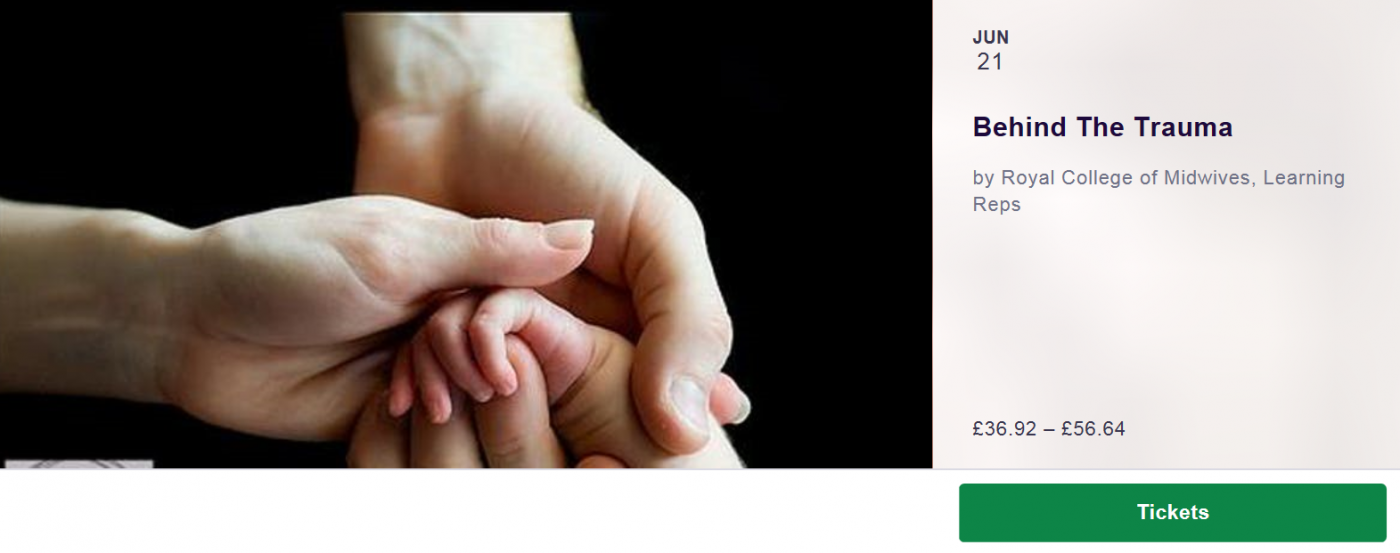 This Friday Prof. Edwin van Teijlingen has been invited to present at this week’s ‘Behind The Trauma’ Conference in Merley House, Dorset . This practitioners’ conference is organised by the Royal College of Midwives (RCM) and tickets are available here! Edwin will be offering a sociological perspective on trauma. His presentation links research conducted on the social/medical model of pregnancy and childbirth [1-6] as well as research on the portrayal of childbirth in the media [7-13]. Bournemouth University’s interdisciplinary research into media and childbirth is conducted jointly with Prof. Vanora Hundley and Dr. Catherine Angell, both in the Centre for Midwifery, Maternal and Perinatal Health (CMMPH), and Dr. Ann Luce in the Faculty of Media & Communication.
This Friday Prof. Edwin van Teijlingen has been invited to present at this week’s ‘Behind The Trauma’ Conference in Merley House, Dorset . This practitioners’ conference is organised by the Royal College of Midwives (RCM) and tickets are available here! Edwin will be offering a sociological perspective on trauma. His presentation links research conducted on the social/medical model of pregnancy and childbirth [1-6] as well as research on the portrayal of childbirth in the media [7-13]. Bournemouth University’s interdisciplinary research into media and childbirth is conducted jointly with Prof. Vanora Hundley and Dr. Catherine Angell, both in the Centre for Midwifery, Maternal and Perinatal Health (CMMPH), and Dr. Ann Luce in the Faculty of Media & Communication.
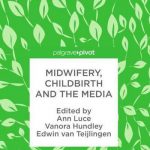 Edwin will be sharing a platform with two Bournemouth University Visiting Faculty, both based at Poole Hospital NHS Foundation Trust: Prof. Minesh Khashu, Consultant Neonatologist and Clinical Director Wessex Maternity Children and Young People Clinical Network and Ms. Jillian Ireland, Professional Midwifery Advocate.
Edwin will be sharing a platform with two Bournemouth University Visiting Faculty, both based at Poole Hospital NHS Foundation Trust: Prof. Minesh Khashu, Consultant Neonatologist and Clinical Director Wessex Maternity Children and Young People Clinical Network and Ms. Jillian Ireland, Professional Midwifery Advocate.
References:
Dr Huseyin Dogan and Dr Paul Whittington have organised an Assistive Technology Symposium on Monday 24th June 2019 in Share Lecture Theatre, Fusion Building, Talbot Campus, Bournemouth University, 09:00 – 17:00.
Dr. Jaeyeon Choe in Faculty of Management organised a panel session, ‘Geographies of religion and spirituality: pilgrimage beyond the ‘officially’ sacred’ at Royal Geographical Society Annual Conference in 2016 (https://blogs.bournemouth.ac.uk/research/2016/09/04/geographies-of-religion-and-spirituality-at-royal-geographical-society-conference-london-2016/). Emerging from the panel papers, she successfully organised a special issue addressing the topic from cross-disciplinary perspectives in the Journal – “Tourism Geographies” https://www.tandfonline.com/toc/rtxg20/current
Dr. Jaeyeon Choe with Dr. Michael Di Giovine (Associate Professor of Anthropology, West Chester University, USA) published an introduction paper as a part of the special issue:
https://www.tandfonline.com/doi/abs/10.1080/14616688.2019.1625072?scroll=top&needAccess=true&journalCode=rtxg20
The papers in this special issue, Geographies of Religion and Spirituality: Pilgrimage beyond the ‘Officially Sacred,’ are placed in the context of a comprehensive theoretical overview of the role that the sacred plays in shaping, conducting, controlling, and contesting pilgrimage. As scholarship examining the lived experiences of travelers has demonstrated, pilgrimages need not necessarily be religious in nature, nor be officially sanctioned. Rather, if pilgrimages are perceived as ‘hyper-meaningful’ by the practitioner, the authors in this special issue argue that a common denominator of all of these journeys is the perception of sacredness—a quality that is opposed to profane, everyday life. Separating the social category of ‘religion’ from the ‘sacred,’ these articles employ an interdisciplinary approach to theorize sacredness, its variability, and the ways in which it is officially recognized or condemned. Thus, the authors pay particular attention to the authorizing processes that religious and temporal power centers employ to either promote, co-opt, or stave off, such popular manifestations of devotion, focusing on three ways: through tradition, text or institutionalized norms. Referencing examples from across the globe, and linking them to the varied contributions in this special issue, this introduction complexifies the ways in which pilgrims, central authorities, locals and other stakeholders on the ground appropriate, negotiate, shape, contest, or circumvent the powerful forces of the sacred. Delving ‘beyond the officially sacred,’ this collective examination of pilgrimages, both well-established and new; religious and secular; authorized and not; the contributions to this special issue, as well as this Introduction, examines the interplay of a transcendent sacred for pilgrims and tourists so as to provide a blueprint for how work in the geography of religion and the fields of pilgrimage and religious tourism may move forward.
We hope all scholars enjoy the 8 papers, from 12 authors and 8 countries!

CoPMRE held its Spring Visiting Faculty Morning at the EBC with a theme of Surgical Futures. One of our guest speakers was Dr Jason Moore, Associate Professor in Mechanical Engineering, The Pennsylvania State University (USA) who presented his research on how robotics can enhance the training of future surgeons. He discussed the mechanical development of an advanced robotic medical simulation training system which allows the user to virtually practice on a diverse number of human anatomies whilst offering guided feedback. . A full report for this event can be found here VF Report Spring 2019
The next event will be held on 3rd December 2019.
It was with great pleasure that I presented at the recent Association of University Administrators Annual Conference at the University of Manchester. With the conference theme of ‘HE: Fit for the Future?’, 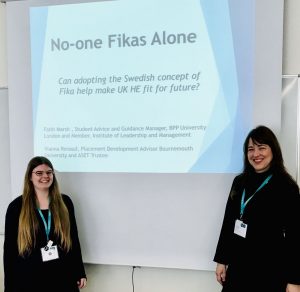 it was a wonderful opportunity to share the key observations and learning gained by my fellow UK delegates during the 2018 AUA Study Trip to Sweden.
it was a wonderful opportunity to share the key observations and learning gained by my fellow UK delegates during the 2018 AUA Study Trip to Sweden.
Representatives from six British institutions including the University College London, BPP, De Montfort University, University of Portsmouth, and Anglia Ruskin University were chosen where I was proud to represent BU. Recording our observations whilst visiting various Swedish institutions and HE associations, the report has just been released on the AUA website.
One element of Swedish Higher Education that we found quite intriguing was that of taking a ‘Fika’ break. Essentially what we would term as a communal coffee break with a sweet bun or pastry, we found it taking place twice a day everywhere that we went where all members of a team would gather and chat. Enforced by senior managers, it was deemed to be a necessary part of everyday work life on campus as it was an extension of cultural traditions. For the British delegates observing, we felt that by implementing such a system in the UK HE sector, or our own adaptation of it, there would be clear advantages and benefits. Whilst we could see this positively impacting staff morale, establishing and developing closer relationships with both direct and indirect colleagues, growing a greater awareness of campus life, amongst many others, there was a certain amount of uncertainty around senior management being supportive of these short breaks, particularly given the current stress regarding resourcing.
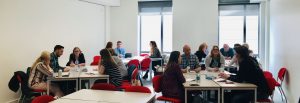 During our conference presentation, my co-presenter Faith Marsh from BPP London and I gave the attendees time to explore at their tables their thoughts on if and how they could foresee implementing a Fika break into their daily patterns. It became very clear that everyone who attended unanimously agreed that whilst a daily break would be frown upon and ultimately impossible, the idea of a weekly or fortnightly staff break would be possible. We discussed how we could all take the initiative forward at our own campuses and given how many of us have been in contact since, we shall see how things progress along the Swedish way!
During our conference presentation, my co-presenter Faith Marsh from BPP London and I gave the attendees time to explore at their tables their thoughts on if and how they could foresee implementing a Fika break into their daily patterns. It became very clear that everyone who attended unanimously agreed that whilst a daily break would be frown upon and ultimately impossible, the idea of a weekly or fortnightly staff break would be possible. We discussed how we could all take the initiative forward at our own campuses and given how many of us have been in contact since, we shall see how things progress along the Swedish way!
For further information and the report:
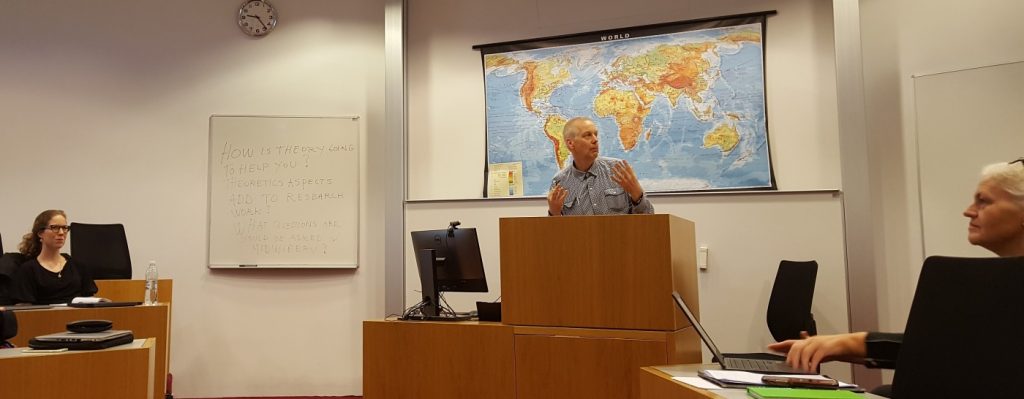 Today BU’s professor Edwin van Teijlingen and FHSS (Faculty of Health & Social Sciences) and Visiting Faculty Jillian Ireland presented their work at NorNAM (Nordic Network of Academic Midwives). The newly created network met in Reykjavik, Iceland for a three-day course on theories and models for midwifery. Prof. van Teijlingen spoke about the medical/social model of pregnancy & childbirth and Jillian, who is also Professional Midwifery Advocate at Poole Hospital NHS Foundation Trust, presented the A-EQUIP model which is widely used in the UK.
Today BU’s professor Edwin van Teijlingen and FHSS (Faculty of Health & Social Sciences) and Visiting Faculty Jillian Ireland presented their work at NorNAM (Nordic Network of Academic Midwives). The newly created network met in Reykjavik, Iceland for a three-day course on theories and models for midwifery. Prof. van Teijlingen spoke about the medical/social model of pregnancy & childbirth and Jillian, who is also Professional Midwifery Advocate at Poole Hospital NHS Foundation Trust, presented the A-EQUIP model which is widely used in the UK.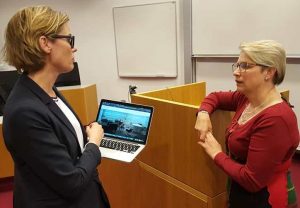
Social scientists can bring different perspectives and theoretical understandings to research into midwifery and maternity care. Today’s focus was on the social and medical model [1-5]. The medical model is ‘easy’ to understand, widely used in the media, based on medical science and claims to rely largely on objective measurement of symptoms and clinical observation. It offers individual treatment solutions for individual patients. The social model argues that there is inter-dependency between the ill person and their immediate and wider environment. The social model focuses on everyday life and the social, socio-economic, cultural and environmental aspects of health. It considers a wider range of factors that affect health, such as lifestyle, gender, poverty (or health inequality more generally), discrimination, and where and how we live. The social model is generally not individualist, but complex and multi-dimensional and often does not offer easy solutions. Solutions to health problem can be found at a population level and hence can be political or social as well as, for example, changes in the individual’s lifestyle.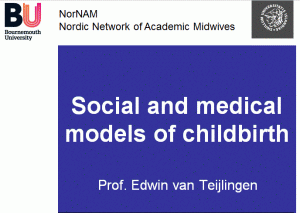
The social model maintains that pregnancy and childbirth are largely physiological events that occur in most women’s lives. Following this line of thinking, the social model argues that pregnancy and childbirth do not normally need medical intervention or the transfer to hospital. A social model of care accepts childbirth as a normal social event in which preventative measures can be used. The medical model portrays a different view, namely that childbirth is potentially pathological, and therefore every woman is potentially at risk when she is pregnant and/or in labour. In short the medical model wants us to believe that pregnancy and childbirth are only safe in retrospect.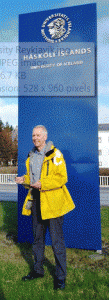
The medical model is often portrayed in the media as the most appropriate and hence ‘safe’ approach to pregnancy and childbirth and not only ‘controls’ women, but also their families, friends and health care providers. Understanding key sociological models of pregnancy and childbirth can help politicians, journalists, policy-makers, midwives, doctors, and other health care providers, childbirth activists as well as pregnant women and new mothers (and their partners) to put issues around ‘normal birth’ into perspective.
References:
This conference will explore the outcomes of collaborative research (Bournemouth University and Royal Bournemouth Christchurch Hospitals NHS Foundation Trust) focused on improving nurse retention. This two-year project led by Dr Janet Scammell from HSS and funded by the Burdett Trust for Nursing will conclude this summer. The project dissemination conference will provide an opportunity to explore our findings, as well as enable participants to share practice through participation in workshops focused on authentic leadership and valuing staff, supporting staff health and wellbeing and staff development. There will also be a small exhibition.
This conference will take place at Bournemouth University’s Talbot Campus from 10am-3pm on July 1st 2019.
This is free to attend and a buffet lunch will be provided.
Please register now as space is limited!
Registration via Eventbrite :